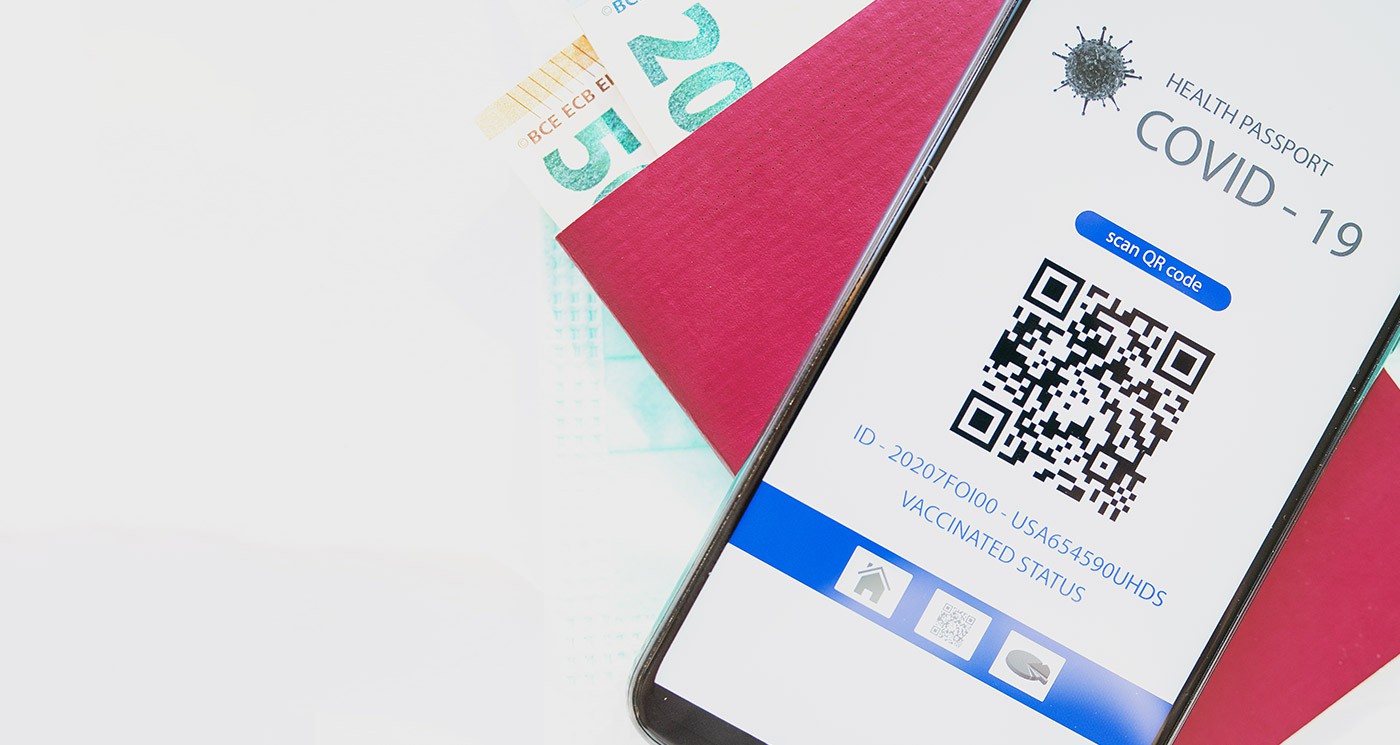Dr Sharon Hakkennes, senior director analyst at Gartner
Digital vaccine certificates, also known as vaccine passports, are emerging as a solution with the potential to support business and society to continue to reopen across the country … and across the world, while minimising the risk of a new wave of infection. They present an opportunity to facilitate the return of individuals vaccinated against COVID-19 to restricted spaces such as work locations and open borders for international travel.
In mid-January this year, a coalition of large technology and health companies launched the Vaccine Credential Initiative to create a system for storing and retrieving digital records of vaccinations. In the same time frame, the World Health Organisation (WHO) launched a digital health working group to develop a framework and standards for a smart digital vaccine certificate for yellow fever and COVID-19, paving the way to add other vaccines later.
High-profile efforts like these increase the potential that vaccine passports will become a reality, even as important questions remain, including the technology that will be used, the source and verification of data, and definitions of immunity among them.
Uncertainties of vaccine passports
There are a number of obstacles standing in the way of wide-scale adoption of vaccine passports. Private and public sector organisations must understand the pitfalls, as well as the promise, so they can plan policies if they become a reality.
Key questions that stakeholders, including policymakers, are looking to answer include:
- Standardisation – Who will set the standards? Will there be multiple standards worldwide? How is immunity defined?
- Use – How will the certificates be used? For travel? Work? Entertainment? Will the uses pass legal scrutiny?
- Acceptance – Who will accept certificates? If there are multiple certificates, will some be accepted more widely than others?
- Buy-in – Will people use the certificates? Will certificates have the support of governments?
- Equity – Can people access and manage their digital information? Will certificates create social stigmas or exacerbate the digital divide?
- Governance – Who will oversee the systems and data? How will privacy be protected? How will forgery be identified and combatted?
- Usefulness – Will certificates go out-of-date if vaccines don’t provide long-term immunity? Will certificates need immunity information for multiple strains? Will different groups exhibit different levels of vaccine effectiveness?
- Verification – How will people with immunity be verified? Who will have access to immunisation records? How will that data be confirmed as accurate?
- Infrastructure – Can existing systems handle the data and security needs of digital certificates? Can these systems be integrated and offer interoperability?
- Unintended consequences – Will digital certificates create greater distrust of vaccines? Will it create extra steps for vaccination? Will people be incentivised to get infected to get a certificate?
What society needs to achieve wide-scale use
For a digital vaccine passport solution to work, it must achieve wide scale end-user adoption. Given the above challenges, organisations considering using vaccine passports must buy in to governance frameworks that allow for the acquisition, equity, verification and sharing of immunisation data.
At a high-level, a digital vaccine passport must enable consent-based COVID-19 vaccination records to be accessed in a secure, verifiable and privacy preserving way. It must work across organisational and jurisdictional boundaries. It must also be built on international standards and in a secure, decentralised infrastructure. Data standardisation, in terms of what data is acquired, how it’s formatted and exchanged, is critical.
While many questions remain about vaccine passports, the outlook appears promising. Data-driven applications have already provided significant aid in addressing the pressing, global scenarios spurred by the pandemic. Investigating this technology in the near-term will inform the plans and strategies of public and private sector organisations – positioning them to stand prepared to leverage this solution in returning to normal.
About the author

Sharon Hakkennes is a senior director analyst at Gartner, focused on healthcare. In particular, she advises clients on clinical engagement and change management, strategy development, information management, data and analytics and ICT shared services delivery in the healthcare environment.
ดร. ชารอน ฮักเคนเนส นักวิเคราะห์อาวุโสของการ์ทเนอร์
ใบรับรองวัคซีนดิจิทัลหรือที่รู้จักกันในชื่อวัคซีนพาสปอร์ตถือเป็นแนวทางการแก้ไขปัญหาใหม่ที่มีความเป็นไปได้ในการสนับสนุนธุรกิจให้กลับมาดำเนินต่อและให้สังคมกลับมาใช้ชีวิตได้เหมือนเดิมอีกครั้งทั่วประเทศและทั่วโลก นอกจากช่วยลดความเสี่ยงในการติดเชื้อระลอกใหม่แล้ว ยังเป็นการเพิ่มโอกาสและความสะดวกในการส่งบุคคลที่ได้รับการฉีดวัคซีนป้องกันโควิด-19 แล้วกลับมายังสถานที่กักตัว เช่น สถานที่ทำงาน และประเทศที่เปิดให้เดินทางระหว่างประเทศ
ช่วงกลางเดือนมกราคมที่ผ่านมากลุ่มบริษัทเทคโนโลยีและสุขภาพขนาดใหญ่หลายแห่งได้ร่วมมือกันเปิดตัว “โครงการหนังสือรับรองประวัติการรับวัคซีน (The Vaccine Credential Initiative)” เพื่อสร้างระบบการจัดเก็บข้อมูลและเรียกดูบันทึกการรับวัคซีนแบบดิจิทัล ซึ่งในช่วงเวลาเดียวกันองค์การอนามัยโลก (WHO) ก็ได้เปิดตัวคณะทำงานด้านสุขภาพดิจิทัลเพื่อพัฒนากรอบการทำงานและมาตรฐานใบรับรองวัคซีนดิจิทัลอัจฉริยะสำหรับโรคไข้เหลืองและโควิด-19 เพื่อปูทางไปสู่การเพิ่มการรับรองการรับวัคซีนประเภทอื่น ๆ ในภายหลัง
ความพยายามอย่างหนักจากทุกภาคส่วนเหล่านี้จะช่วยเพิ่มศักยภาพในการพัฒนาวัคซีนพาสปอร์ตให้เกิดขึ้นจริง แม้จะยังมีคำถามสำคัญหลายประการ ทั้งในเรื่องของเทคโนโลยีที่จะนำมาใช้ แหล่งที่มาและการตรวจสอบข้อมูล รวมถึงคำจำกัดความของภูมิคุ้มกันในกลุ่มของพวกเขา
ความไม่แน่นอนของวัคซีนพาสปอร์ต
การนำวัคซีนพาสปอร์ตมาใช้ในวงกว้างมีอุปสรรคเกิดขึ้นมากมาย องค์กรภาคเอกชนและภาครัฐต้องทำความเข้าใจปัจจัยเสี่ยงต่าง ๆ ที่อาจส่งผลเสียเช่นเดียวกับคำมั่นสัญญา จึงจะสามารถวางแผนการนำมาใช้จริงได้อย่างมีประสิทธิภาพ
10 คำถามสำคัญที่ผู้มีส่วนได้ส่วนเสียรวมถึงผู้กำหนดนโยบายของรัฐหรือองค์กรควรร่วมค้นหาคำตอบ
- การกำหนดมาตรฐาน– ใครจะเป็นผู้กำหนดมาตรฐาน? ทั่วโลกจะมีหลายมาตรฐานหรือไม่? กำหนดความหมายของภูมิคุ้มกันไว้อย่างไร?
- การนำมาใช้– ใบรับรองจะถูกนำมาใช้อย่างไร? ใช้กับการเดินทาง? การทำงาน? หรือ ความบันเทิง? โดยการใช้งานใบรับรองนี้จะผ่านการตรวจสอบทางกฏหมายด้วยหรือไม่?
- การให้การยอมรับ– ใครจะยอมรับใบรับรองวัคซีนนั้นบ้าง? หากมีใบรับรองหลายแบบ จะมีใบรับรองไหนที่ได้รับการรับรองในวงกว้างมากกว่าใบรับรองอื่น ๆ ?
- การเห็นด้วย– ประชาชนจะใช้ใบรับรองเหล่านี้ด้วยหรือไม่? ใบรับรองจะได้รับการสนับสนุนจากรัฐบาลไหม?
- การให้ความเสมอภาค– ประชาชนจะสามารถเข้าถึงและจัดการข้อมูลดิจิทัลส่วนตัวได้ด้วยไหม? ใบรับรองจะทำให้เกิดการตีตราทางสังคมหรือเกิดการแบ่งแยกทางดิจิทัลที่รุนแรงขึ้นหรือไม่?
- การกำกับดูแล– ใครจะเป็นผู้ดูแลระบบและข้อมูล? ความเป็นส่วนตัวจะได้รับการคุ้มครองอย่างไร? การปลอมแปลงเอกสารจะถูกค้นพบและจัดการอย่างไร?
- การนำมาใช้ประโยชน์หลากหลาย– ใบรับรองจะมีวันหมดอายุไหมหากวัคซีนมีผลในระยะเวลาจำกัด? ใบรับรองควรต้องมีข้อมูลภูมิคุ้มกันสำหรับสายพันธ์อื่น ๆ ด้วยหรือไม่? ความแตกต่างของกลุ่มบุคคลจะทำให้การแสดงผลประสิทธิภาพของวัคซีนต่างกันไหม?
- การตรวจสอบและพิสูจน์- ผู้ที่มีภูมิคุ้มกันจะได้รับการตรวจสอบอย่างไร? ใครจะเข้าถึงบันทึกการฉีดวัคซีนได้บ้าง? จะยืนยันความถูกต้องของข้อมูลนั้นอย่างไร?
- การนำระบบโครงสร้างพื้นฐานมาใช้ – โครงสร้างพื้นฐานที่มีอยู่แล้วสามารถจัดการข้อมูลและความต้องการด้านความปลอดภัยของใบรับรองดิจิทัลได้หรือไม่? จะควบรวมระบบหรือโครงสร้างเหล่านี้และทำงานร่วมกันได้หรือไม่?
- ผลที่อาจเกิดตามมาโดยไม่ตั้งใจ- ใบรับรองดิจิทัลจะทำให้เกิดความไม่มั่นใจในวัคซีนเพิ่มขึ้นไหม? จะเป็นการเพิ่มขั้นตอนการรับวัคซีนหรือไม่? จะกลายเป็นแรงจูงใจให้ผู้คนไม่ดูแลตัวเองปล่อยให้ติดเชื้อเพื่อให้ได้ใบรับรองหรือไม่?
สิ่งที่สังคมต้องไปให้ถึงเพื่อให้เกิดการใช้งานในวงกว้าง
หนทางที่ทำให้วัคซีนพาสปอร์ตใช้งานได้จริงนั้น การทำให้ผู้ใช้ยอมรับในวงกว้างต้องเกิดขึ้น ด้วยความท้าทายข้างต้นองค์กรที่กำลังพิจารณาการใช้วัคซีนพาสปอร์ตต้องเห็นด้วยในกรอบการกำกับดูแลที่อนุญาตการเข้าถึงสิทธิ์ ความเท่าเทียม การพิสูจน์ความถูกต้อง และแบ่งปันข้อมูลการรับวัคซีน
วัคซีนพาสปอร์ตดิจิทัลในระดับสูงจะต้องเปิดใช้งานบันทึกการฉีดวัคซีนโควิด-19 ตามความยินยอมเพื่อให้สามารถเข้าถึงได้ด้วยวิธีที่ปลอดภัยตรวจสอบได้และรักษาความเป็นส่วนตัว และต้องสามารถทำงานข้ามองค์กรและข้ามเขตพรมแดนได้ นอกจากนี้ยังต้องสร้างขึ้นบนมาตรฐานสากล มีความปลอดภัยและโครงสร้างพื้นฐานแบบกระจายอำนาจ ในแง่ของข้อมูลที่ได้มาต้องมีการกำหนดมาตรฐานข้อมูล การจัดรูปแบบและการแลกเปลี่ยนเป็นสิ่งสำคัญ
แม้ว่าจะยังมีคำถามเกิดขึ้นมากมายเกี่ยวกับวัคซีนพาสปอร์ต แต่ก็ดูเหมือนเป็นแนวโน้มที่ดี แอปพลิเคชันที่ขับเคลื่อนด้วยข้อมูลได้ให้ความช่วยเหลือสำคัญในการจัดการกับสถานการณ์เร่งด่วนทั่วโลกที่เกิดจากการแพร่ระบาด อีกไม่นานการตรวจสอบเทคโนโลยีนี้จะแจ้งให้ทราบถึงแผนและกลยุทธ์ขององค์กรภาครัฐและเอกชน เพื่อเตรียมความพร้อมในการนำวัคซีนพาสปอร์ตมาใช้ประโยชน์เพื่อการฟื้นคืนกลับสู่สภาวะปกติ
เกี่ยวกับผู้เขียน

ดร. ชารอน ฮักเคนเนส นักวิเคราะห์อาวุโสของการ์ทเนอร์ ให้ความสนใจเรื่องการดูแลสุขภาพ โดยเฉพาะอย่างยิ่งเธอให้คำแนะนำลูกค้าเกี่ยวกับการมีส่วนร่วมทางคลินิกและการจัดการการเปลี่ยนแปลง การพัฒนากลยุทธ์ การจัดการข้อมูล ข้อมูลและการวิเคราะห์ และการส่งมอบบริการที่ใช้ร่วมกันของเทคโนโลยีสารสนเทศและการสื่อสารในสภาพแววล้อมด้านการดูแลสุขภาพ

